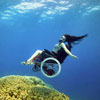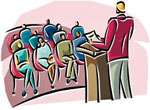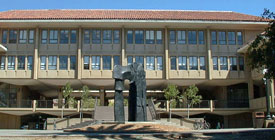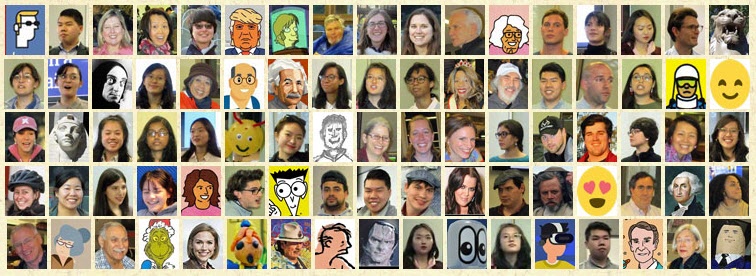
|
Design, Technology , and Engineering benefitting individuals
with disabilities and older adults in the local community |
February 28, 2020 |
|
|
|
|

Perspectives is the newsletter of the
Stanford course,
Perspectives in Assistive Technology.
Film Screening - Fixed: The Science / Fiction of Human
Enhancement
This issue invites you to attend the film screening in the
Peterson Building
and the remaining class
sessions.
|
Perspectives in Assistive
Technology is a Winter Quarter Stanford course - entering its
fourteenth year - that explores the design, development, and use of
assistive technology that benefits people with disabilities and older adults.
It consists of semi-weekly classroom discussions; lectures by
notable professionals, clinicians, and assistive technology users; tours
of local medical, clinical, and engineering facilities; student project
presentations and demonstrations; an Assistive Technology Faire; and a
film screening. |
Film Screening - Tuesday, March 3rd at
4:30pm in the atrium of the
Peterson
Building.
Please RSVP
if you plan to attend to ensure adequate chairs and popcorn.
|

|
Fixed: The Science / Fiction
of Human Enhancement
|
Abstract: What does "disabled" mean when a man
with no legs can run faster than most people in the world? What does "normal"
mean when cosmetic surgery procedures have risen over 450% percent in the last
fifteen years and increasing numbers of people turn to "smart drugs" every day
to get ahead at school or work? With prenatal screening able to predict
hundreds of probable conditions, who should determine what kind of people get
to be born? If you could augment your body's abilities in any way imaginable,
would you?
From bionic limbs and neural implants to prenatal
screening, researchers from around the world are hard at work developing a
myriad of technologies to fix or enhance the human body. Fixed: The Science
/ Fiction of Human Enhancement takes a close look at the drive to be
“better than human” and the radical technological innovations that
may take us there.
Through a dynamic mix of verité, dance, archival,
and interview footage, Fixed challenges notions of normal, the body, and
what it means fundamentally to be human in the 21st century.
|
You are invited to attend this
and all other class sessions - Class sessions will be held on
Tuesdays and Thursdays from 4:30 to 5:50pm and are
open to the greater Stanford community. You need not be a Stanford student to
attend, no signup is required, and there is no charge. The full schedule can be
found here |
 |
|
|
Same classroom! -
The course will be held in classroom 282 in the
Lathrop
Library located at the corner of Lasuen Mall and Serra Mall, adjacent to
Memorial Auditorium and the Oval. It seats as many as 150 people in a flexible
and accessible space. Here is a webpage with maps, directions, and photos. |
 |
|
Remaining class sessions:
Upcoming local event:

Sunnyvale Aging 2.0 Chapter Kickoff
Event - Sunnyvale Aging 2.0 Chapter will be hosting it's 2020 Kickoff
Event. There will be two presentations and an Innovator Showcase.
| When: |
|
Saturday, February 29th from 1:30 to 5:00pm |
| Where: |
|
Sunnyvale Senior Center, 550 East
Remington Drive, Sunnyvale -
map |
| Information: |
|
This event is free and open to the public.
Please register in person at the Sunnyvale Senior Center or on
Eventbrite
by Friday, February 28th. |
|
Research study:

Microsoft Research is running an
online survey to collect information from people with disabilities who
telework.
"We’re seeking people with
disabilities who regularly telework to learn more about their experiences. The
goal of this study is to understand how teleworking helps people with
disabilities make their work accessible. We want to understand people’s
current work practices, what challenges they face, and what opportunities there
are for improvement. To be eligible to participate, you must fit the following
conditions:"
- Telework: Work from home or another remote
site as part of making your work more accessible for any disabilities that you
have.
- Use collaborative technologies such as
video calling, chat, the phone, shared file directories, collaborative editing
tools, screen sharing, etc. to collaborate with remote colleagues.
- Telework at least once per week
- Are an adult over 18 years of
age
"You will be asked to complete an online
survey to describe your experiences. The survey is expected to take about 30
minutes to complete. You will receive a gratuity of a $25 electronic voucher at
Amazon."
"If you qualify, please fill out the
online
survey."
"Feel free to forward this message to
others who might be interested. If you have any questions, please contact
John Tang." |
Other
Support the
course - Funding in any amount for the course and student projects
is always welcomed. Monetary gifts support approved project expenses,
administrative costs, honoraria for guest lecturers, and the end-of-term
celebration. Refer to the Course and Project Support
webpage for more information.
Email
questions, comments, or suggestions - Please
email me if you have general
questions, comments, or suggestions regarding the course. Thank you again for
your interest.
Dave
|

To unsubscribe from this newsletter, please email
Dave. |
|






